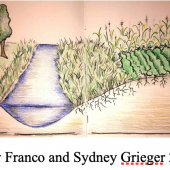
Abstract: This study examined how placemaking curricula shaped teacher candidate (candidate) knowledge, dispositions, and skills to understand, appreciate, and sustain local diversity, as evidenced through candidate reflections and products created in an elementary teacher education course integrating civic science concepts and practices into elementary classrooms. This study explored how placemaking curricula engaged community stakeholders in meaningful shared inquiry on real-world challenges, while meeting state science education standards. Placemaking inquiry projects developed by candidates focused on soil and water conservation, and sustaining diversity in schoolyard spaces. Curricula engaged candidates in learning soil and water conservation techniques from local farmers and conservation leaders, then developing and sharing co-authored civic science children’s books on conservation topics aligned to grade-level standards. As further placemaking curricula, candidates partnered with elementary teachers and students to guide schoolyard observations, designs, and models constructed to sustain diverse abilities, cultures, and ecologies. Presentations to parents and peers celebrated shared insights.
Continue ReadingAbstract: While it is widely recognized that effectively addressing climate change requires a drastic reduction in carbon emissions, we nonetheless find ourselves in an impasse, unable to imagine nor bring about a post-carbon future. This is, in part, because climate change is not only a technological problem, but also a philosophical, cultural, and aesthetic problem—an existential crisis of thinking, or perhaps unthinking. To unthink the carbon regime, higher education must forge new thought models and educational platforms that operate in solidarity across disciplinary scales and territories. This report documents a collaborative course development process for a grant-funded transdisciplinary course entitled: Unthinking Oil: Public Architecture and the Post-Carbon Imaginary. In particular, we discuss a virtual Unthinking Oil Workshop held with students and faculty from a range of disciplines. The workshop provoked broad discussions regarding the role of higher education in addressing the many entanglements between climate change, society, and the built environment.
Continue ReadingAbstract: The field of media education, emerging within the instrumental vision of modernity, has largely ignored its unspoken modernist assumptions. In this article, we argue the time has come to fully engage an embodied view of media from an evolutionary, ecological perspective—what we might call ecological modernism. This is a perspective that views media as evolving mediations through various material/technical practices, where body knowledge, rather than some idea of objective reality, is understood as the empirical ground for how we come to make sense of ourselves and the world. The focus is then shifted from the problem of subject versus object relationships to how subjects and objects are mutually constitutive. By extension, the juxtaposition of the concept of citizen with the body clarifies yet another crucial dimension of the embodied perspective. Two examples of “citizen”-based media education projects are briefly reviewed from this ecological modernist perspective in order to consider the implications of resituating grounded citizen-oriented media education.
Continue Reading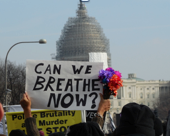
Abstract: Writing an essay about hope in these times feels like an indulgence of privilege. Still, with full awareness of the implications, I want to insist that we not lose hope, that we make it meaningful, and that we go so far as to make its cultivation a central focus of our lives and work. This essay is intended to serve as a calling card for like-minded inquirers to reach out across time and space, to find ourselves and one another in the engaged optimism of meaningful work in the world, and as an acknowledgment of appreciation for all of those who do so.
Continue Reading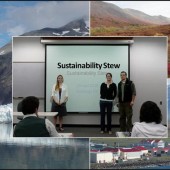
The concepts and practices surrounding sustainability are increasingly the focus of many new post-secondary and graduate education programs. However, the term sustainability refers to a complex mixture of disciplines, methods, contexts, and topics. This complexity is often confusing and can create barriers to learning. Comprehensive understanding of sustainability issues requires that students engage in an active learning process, focusing on context and perspective. Our “Sustainability Stew” curriculum, designed by doctoral students in various fields related to sustainability, is intended to guide sustainability education while offering the freedom to explore complex issues in an active, project-based learning environment. In this paper, we provide background and details for the design of the Sustainability Stew Guide and report results from student surveys on the curriculum itself from one undergraduate sociology course at the University of Alaska Fairbanks (n=37), one community college course at Delaware Technical and Community College (n=11), and one graduate-level research group at the University of Delaware (n=7). Student survey results and instructor reports suggest that the Sustainability Stew curriculum is an effective and innovative approach to sustainability education. Finally, we offer analysis and future directions for similar post-secondary sustainability education. Our objective is to offer a novel exercise to aid educators in teaching and discussing the concepts of sustainability in a way that encourages critical, multi-disciplinary engagement.
Continue Reading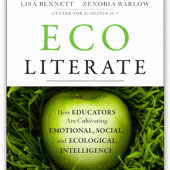
Daniel Goleman, Lisa Bennett, and Zenobia Barlow, in their book Ecoliterate: How Educators are Cultivating Emotional, Social, and Ecological Intelligence, share the stories of a new generation of educators and activists that are displaying the five practices of socially and emotionally engaged ecoliteracy: developing empathy for all forms of life; embracing sustainability as a community practice; making the invisible visible; anticipating unintended consequences; and understanding how nature sustains life. This book provides useful examples and serves as a guide for educators interested in developing a sustainability-focused learning environment for their students through the framework of ecoliteracy. The purpose of the following review is to first present the purpose, argument, and organization of Ecoliterate, and to then evaluate the claims and implications it presents for practitioners of sustainability education.
Continue Reading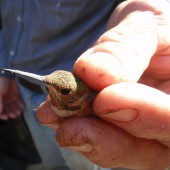
This paper explores examples of the ways that indigenous and traditional stories are tools to guide humans through complex interactions with ecosystems and to remember our shared fate with the land. Traditional stories are not mere superstition or poor substitutes for scientific thinking; they are made up of extremely complex, finely coded information on human subsistence and infused with elements that ensure they continue to be told and remembered
Continue Reading